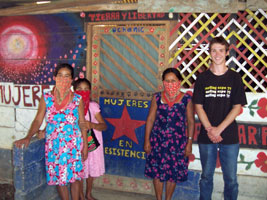21 May 2009 Edition
A young Irish rebel with the Zapatistas

INSPIRING: Women’s co-op
ÓGRA Shinn Féin activist GARY McCLEAN recently spent three months as a volunteer worker in Autonomous Rebel Zapatista Territory (Chiapas, Mexico). Now back in Ireland, Gary reflects on events and progress there.
SINCE the insurrection of January 1994, the Zapatista movement has been relentless in its resistance to neo-liberal economics and government oppression and has been actively working towards building a fairer and more inclusive society for the traditionally marginalised and exploited indigenous populations of Mexico.
Many indigenous communities in Chiapas have been transformed by the events of the past decade and a half and have emerged with a new form of social organisation based on participatory democracy and a new set of just and fair economic relations.
Although poverty and malnutrition remain relatively high in Chiapas, with many still lacking basic necessities, it is clear to see how these communities have become organised to build themselves out of poverty. One incredibly successful example has been the development of organic coffee co-operatives, which use environmentally-sustainable cultivation techniques to produce a high-quality product which then serves as a source of income for many campesinos.
WOMEN’S CO-OPS
Another inspiring case has been the establishment of women’s clothing co-operatives. When I met with one such co-operative they explained to me how this had changed their lives.
“Before [the uprising], there was very little work for women to do except work around the house. One of the things the Zapatistas did was to organise women’s co-operatives, which gave women an opportunity to develop skills in trades and the co-operative provided a means to purchase materials and an outlet to sell the products.”
Such progress has been occurring despite a perfidious campaign by the Mexican Government and its ideological allies to undermine the entire process. Fearful of the Zapatistas’ autonomy, their economic reorganisation and experimentations with real participatory democracy, the Government and the armed forces have been engaged in an ongoing war against these communities. Tactics have involved arming and training paramilitary forces whose efforts in harassment, intimidation and violence have resulted in many deaths and massacres, such as that of Acteal in 1997, when 45 members of a pacifist group - including children and pregnant women - were massacred by pro-Government paramilitaries while attending a prayer meeting three days before Christmas.
The Government has also been seeking to fuel division and conflict within the indigenous populations and the tensions this creates threaten a further escalation of violence.
RESISTANCE
Despite paramilitary intimidation and a racist, vilifying propaganda campaign, the Zapatistas have been unswerving in their efforts to develop autonomous and democratic institutions. As a result of centuries of economic exploitation, isolation from decision-making and cultural oppression, the Zapatista movement was born.
Work, land, housing, food, health care, education, independence, freedom, democracy, justice and peace
– First Declaration of the Lacandon Jungle - Zapatista Army of National Liberation (Ejército Zapatista de Liberación Nacional, EZLN)
Today, as in 1994, demands for democracy, liberty, justice and peace continue to characterise and guide the Zapatistas in their campaign to reorganise society to better the livelihoods of a long-forgotten people.
Placed within a wider context, the Zapatista movement has been observed by many sympathisers as a symbol of a much larger resistance to globalisation and neo-liberal hegemony. The international publicity and solidarity that has been attracted by the Zapatistas has played a key role in putting much-needed pressure on the Mexican Government to refrain from launching an all-out war to eliminate this movement and its popularly-supported social programmes. Although one effect of this has been to push the war deeper underground and is now reflected mainly through paramilitary violence, the positive impact of international solidarity and support is undoubtedly apparent. A movement such as ours has much to learn from the Zapatistas and should be doing everything it can to be a part of this network of international solidarity. We must support the Zapatistas, their cause and their demands, since this also is our cause and these are our demands.


